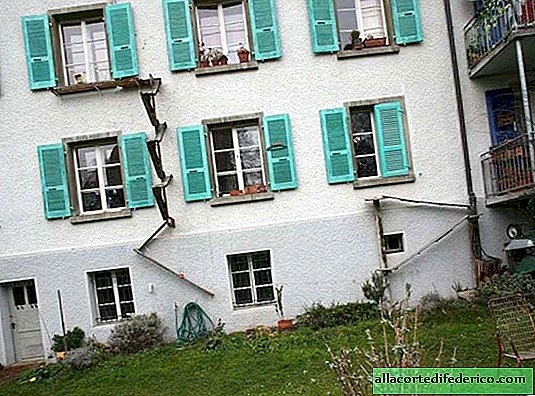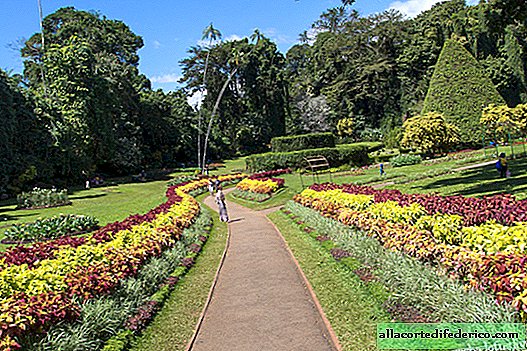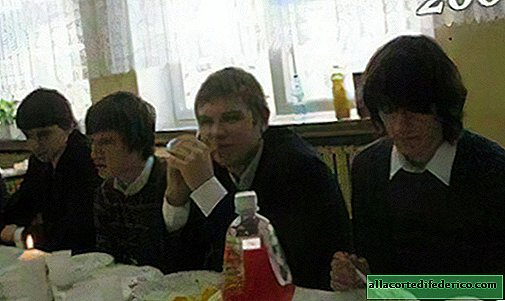What to expect when you marry an Indian
TravelAsk continues a series of interviews with subscribers, and today is our story about Elena, which told how her life changed and how the country of contrasts opened up to her after she married Neil, a citizen of India.
My husband and I met more than 10 years ago on a travel site. Married in India according to the Hindu rite. We lived in India for some time, but decided that it was better in Moscow, since I can not stand the heat and do not like Indian food, and working in India is very difficult (it simply does not exist). We try to travel to India 2 times a year (strictly in January - February and in August due to the work and climate of India). Now we both teach English. I teach children and teens, and Neil - adults. In Russia, the most difficult thing for a husband is the Russian language, there are difficulties in finding a job (since it is impossible to find a place without Russian knowledge).

- Was it hard to decide on marriage? Still, the mentality of the Indians is quite different from the Russian. And how did the husband's family take this decision?
- For some reason, deciding to get married was very simple. Neil's parents are very modern and educated people, so they accepted me very quickly and easily. I really like to go to them. Until now, there are contractual weddings in India, that is, often the bride and groom first meet only at their own wedding. And this is normal for the whole country. But not quite normal for Europeans! Can you imagine that you meet your future husband or wife only at the celebration? This is very difficult for our understanding. In general, in some very patriarchal regions of India, the marriage of an Indian with a foreigner is simply impossible, since the bride was already chosen when she was 8-10 years old. In large cities, contractual marriages are gradually becoming a thing of the past. By the way, the number of divorces is growing!

- Did you have to change something in your habits?
- Since we live mainly in Russia, I did not have to change anything in my habits, but Neil had to adapt to our climate, food and the fact that in winter there is almost no sun. In general, he is pleased with his life in Moscow, especially he enjoys public transport, a huge number of supermarkets and security (you can walk late on the street - this is simply unimaginable in India!). People in Russia, in his opinion, are more honest and decent than in India. I had to learn how to cook soup with spices a la "India": ready-made mixes such as adjika and hops-suneli are great.

- What shocked and surprised the first time in India: customs, everyday habits, people's attitudes, cuisine?
- In India, of course, a huge number of people everywhere are shocking, especially men, terrible dirt. I absolutely do not like Indian food, so when I travel I become a raw foodist, it's easier! A custom that I do not like is the desire of Indians to touch you by the face, this is such a sign of kindness and good feelings. At first, my mother-in-law tried to do this, but I weaned her :). If you take into account that the Indians, in principle, have little hygiene, it’s not very pleasant when someone touches your face.
In India, I am shocked by the "religious issue" associated with the confrontation between Muslims and Indians. The former believe that the Hindu majority oppresses them, and the latter that Muslims should not be given any privileges in society. Indians are very interested in politics, actively participate in elections and rallies.

Everyday habits are strange: everyone takes a shower early in the morning, and then before dinner. Morning begins with tea and cookies. For breakfast, vegetables and spices can also be eaten (I'm sure that few people do this in Russia). In general, in India they eat a lot and often ... dinner happens at 11 pm, and this is a very plentiful meal (a huge mountain of rice, lentil soup and from 3 to 6 vegetable dishes). My mother-in-law prepares 5-6 different dishes for lunch. Indians try not to store food for more than 1 day, it happens that yesterday’s food is not consumed at all (I think this is due to the climate and the fact that not many have refrigerators).

Indian women wash their laundry manually (washing machines are still a luxury item). In India, no one pays for water, it is free. Unfortunately, this policy and overpopulation led to a serious crisis with drinking water in Delhi and Chennai, there were even fights and fights over a bucket of water ...
The attitude of people in India towards each other is extremely incredulous: there is a lot of deception everywhere due to the constant shortage of all resources (food, water, transportation, work, etc.). But foreigners are considered solely as a “money bag”, from which they try to shake out more money. By the way, foreigners are deceived more often, because they most likely will not go to the police! But the people in the villages are very kind and friendly, ready to give you everything, to feed and take care of you in every possible way, to give you the last (you will not see this in the cities).

- What are the opportunities for women who are married to citizens of India, unlike ordinary tourists? Are there any privileges? On the contrary, cons?
- The biggest advantage in marriage with an Indian is the opportunity to get an OCI passport (overseas citizen of India), this document cost me 10,000 rubles and 6 months of waiting (I did it through the Indian Embassy in Moscow). OCI makes it possible to enter India without a visa and live any amount of time (years) + officially work + use various services at the "local" price, not the price for foreigners. But you can’t vote and own the plantations. The document is issued for life and does not require renewal or updating. If in any other country I have a problem, then I can contact the Indian Consulate as well.

- Have you encountered any bureaucratic delays in India?
India is a paradise for bureaucracy, Indians love to fill out 101 documents, then 50 copies of it, with or without photos. Bureaucracy and slowness are two huge problems across the country. Now the government is trying to “digitalize” all sectors, but the process is slow: the Indians do not like to change something and rush. They prefer to do everything "the old fashioned way." Therefore, bribery flourishes at all stages of processing any documents. After all, you do not want to wait 1 piece of paper for 7-8 months, right? Therefore, in all state institutions there are "intermediaries" who will get the right document in a couple of days and a couple of hundred rupees. This is how the whole country lives, but the government of Prime Minister Modi is struggling with this and is trying to make it possible to draw up documents online.
- Is it possible in India to find a good job for a European only with knowledge of English?
- The issue of work in India is very acute: there are a lot of people, and few jobs. I’m not sure that a foreigner is basically able to find work in India (if you just start your own business, that’s how many people live in Goa, by the way). Women who marry Indians and live in India do not work anywhere; they are engaged in housekeeping and children.
- Has your attitude towards tourists changed somehow, after India became closer to you?
- I can’t say that I had a special relationship with tourists, but we often meet girls from different countries who travel independently in India (even on the cheapest trains and visit really dumb places where even Indians are afraid to travel). Over the years of travel, we met girls from Israel, the Netherlands and Greece. They are not afraid to eat local food and get to know the locals. Of course, they are constantly being deceived: most often they “cheat” bus / train tickets at a price 10 times higher than the real one. Tourists mostly travel with proven routes where there has been no real India for a long time ... It turns out that their impression of the country is one-sided.



I really want to visit a real Indian village and see how ordinary villagers live, what they eat, what they grow, etc. There was a story that week: we came on foot to a remote village, and decided to go back by bus. A 10-year-old girl in a green dress is walking along the road and grazing 3 cows. Suddenly, she falls to the ground and touches my feet as a sign of respect. We began to talk with her, she told us everything about the school, about how to drink drinking water from a can in a can every day, where and what kind of house she is, how much her grandfather drinks and other details. And all her stories were so simple and interesting. She asked us out of age clever questions. We photographed her as a keepsake and wished that her life would be as good as possible!
- Are there any tips that you would like to share with readers? What you should pay attention to?
- In India, you should always be on the alert and not trust people who are especially eager to help you (for your money, of course). I do not advise looking into the eyes of men: they perceive this as a sign of attention.
It is also more careful to be with monkeys, in many cities they feel like masters and can take anything from you directly from your hands, yet they are adroit.

There are purely household tips. In India, expensive and low-quality toilet paper (if you can even find it in the store, of course), so we bring it from Russia :))) In India, bad pasta: either very expensive foreign, or very cheap and tasteless local ... If I know that If I have a kitchen in India, then I take spaghetti with me (they are easy to pack in a suitcase). I advise you to carry 2 sheets with you - one to make a bed, and the second to cover (or use as a duvet cover). Why? In India, a peculiar idea of cleanliness and hygiene. If you are in India in the winter, you can be sure that the hotel will give you a blanket without a duvet cover ... and this blanket will NEVER be washed. In winter, for example, in Rishikesh I take a sleeping bag.
About water: India is a hot tropical country where you should try to drink 4-5 liters of water daily. Many tourists actively buy bottled water, although it is possible to collect water without fear in drinking taps (and even at railway stations). It is absolutely safe!
About food: I strongly do not recommend eating street food or at suspicious food outlets. This is especially true for non-vegetarian food. Here they can feed a rat, rotten meat and even a baby ... yes, even so. Two days ago they showed news about this. If you are poisoned by street food, believe me, poisoning in a tropical country will be very serious (sit on the toilet for all 10 days of vacation, in the end you will have to drink antibiotics). It is safest to eat raw fruits and vegetables in India.


If you plan to attend temples, I advise you to take separate thick socks with you: firstly, it’s cold to walk on the stone floor in the cold, and secondly, there is no risk of catching the infection from local legs.
If you are in trouble, for example, you have nowhere to sleep, then you can safely go to the gurudwara (this is a Sikh temple). There you will be fed and allowed to spend the night for free. If suddenly you have nowhere to eat (all establishments are dubious and dirty), then try to find a Hare Krishna temple / ashram / ISKCON: Hare Krishnas cook amazingly delicious food and they are just crazy about cleanliness. Be sure that their food is strictly vegetarian, tasty and safe.

















